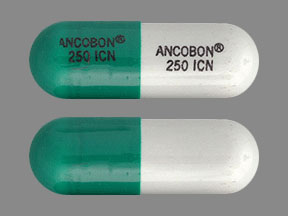
Ancobon Coupons & Savings Card – Discount Prices from $89.12
Brand for: Flucytosine
My prescription
Edit
250MG, Flucytosine (30 Capsules)
Select pharmacy

CVS
$89.12
COUPON PRICE
Walgreens
$310.50
COUPON PRICE
Albertsons
$450.67
COUPON PRICE
Walmart
$1964.67
COUPON PRICEAncobon savings card
Show this card to your pharmacist
CVS
$89.12
BIN
ID
PCN
GRP
015995
LHKPX455968
GDC
DR33
Powered by
More prescriptions for fungal infection
More prescriptions for fungal infection
Ancobon (Flucytosine) dosage forms
Dosage Quantity Price from Per unit 250MG 30 Capsules $103.85 $3.46 250MG 1 Capsule $19.05 $19.05 250MG 20 Capsules $75.33 $3.77 250MG 100 Capsules $303.47 $3.04 500MG 1 Capsule $24.48 $24.48 500MG 20 Capsules $141.98 $7.10 500MG 30 Capsules $203.83 $6.79 500MG 100 Capsules $636.72 $6.37
| Dosage | Quantity | Price from | Per unit |
|---|---|---|---|
| 250MG | 30 Capsules | $103.85 | $3.46 |
| 250MG | 1 Capsule | $19.05 | $19.05 |
| 250MG | 20 Capsules | $75.33 | $3.77 |
| 250MG | 100 Capsules | $303.47 | $3.04 |
| 500MG | 1 Capsule | $24.48 | $24.48 |
| 500MG | 20 Capsules | $141.98 | $7.10 |
| 500MG | 30 Capsules | $203.83 | $6.79 |
| 500MG | 100 Capsules | $636.72 | $6.37 |
What is Ancobon used for?
Ancobon, also known as flucytosine, is an antifungal medication used to treat serious fungal infections. It is often used in combination with other antifungal drugs to treat infections such as cryptococcal meningitis and systemic candidiasis.
How much does Ancobon cost?
The cost of Ancobon (flucytosine) can vary depending on factors such as the pharmacy, location, insurance coverage, and dosage. It is recommended to check with local pharmacies or consult with a healthcare provider for the most accurate and up-to-date pricing information. Additionally, some pharmacies may offer discount programs or generic options that could affect the price.
Why is flucytosine so expensive?
Flucytosine can be expensive due to several factors, including the cost of research and development, manufacturing expenses, regulatory requirements, and market exclusivity. Additionally, as it is used to treat specific fungal infections, the demand may be lower, which can also contribute to higher pricing.
What are the side effects of flucytosine?
Flucytosine can cause several side effects. Common side effects include nausea, vomiting, diarrhea, and loss of appetite. It may also cause bone marrow suppression, leading to anemia, leukopenia, or thrombocytopenia. Other potential side effects include liver toxicity, rash, and confusion. It is important for patients to be monitored regularly by their healthcare provider while taking flucytosine to manage any adverse effects.
Is Flucytosine over the counter?
Flucytosine is not available over the counter. It is a prescription medication and must be prescribed by a healthcare professional.
